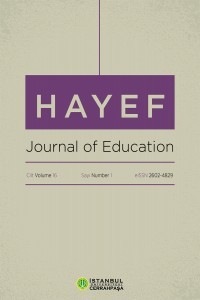AN ANALYSIS OF CANDIDATE TEACHERS’ VIEWS ON THE EFFECT OF TECHNOLOGY USE IN EDUCATION OVER CLASSROOM MANAGEMENT
classroom management, educational technologies, the use of technology for education
An Analysis of Candidate Teachers’ Views On the Effect of Technology Use in Education Over Classroom Management
___
- Balanskat, A., Blamire, R., & Kefala, S. (2006). The ICT impact report: A review of studies of ICT impact on schools in Europe. Brussels: European Schoolnet.
- Baker, E. L. (2001). Technology: How do we know it works? In W. F. Heineke & L. Blasi (Eds.), Methods of evaluating educational technology (pp. 77-84). Greenwich, CT: Information Age Publishing.
- Bentley, T., & Hargreaves, D. H. (2003). Learning futures: An English perspective on information and communication technologies in education. In H. F. O’Neil, Jr., & R. Perez (Eds.), Technology applications in education: A learning view (pp.341-360). Mahwah, NJ: Lawrence Erlbaum Associates.
- Bowman, J., Jr., Newman, D. L. & Masterson, J. (2001). Adopting educational technology: Implications for designing interventions. Journal of Educational Computing Research, 25(1), 81–94.
- Cafoglu, Z. (1992). Sınıf yönetimi. Eğitim Dergisi, (Üç Aylık İlmi Dergi), 1, 152-160.
- Callahan, W. P., & Switzer, T. J. (2001). Technology as facilitator of quality education: A model. In W. F. Heineke & L. Blasi (Eds.), Methods of evaluating educational technology (pp. 215-235). Greenwich, CT: Information Age Publishing.
- Carroll, T. G. (2001). Do today’s evaluations meet the needs of tomorrows networked learning communities? In W. F. Heineke & L. Blasi (Eds.), Methods of evaluating educational technology (pp. 3-15). Greenwich, CT: Information Age Publishing.
- Cetin, F., & Cetin, S. (2000). Ilkogretim okullarina sinif ogretmeni olarak atanan brans ogretmenlerinin meslekle ilgili sorunlari. Milli Egitim, 145, 58-62.
- Edwards, C.H. (2000). Classroom discipline and management (5th. Ed.), New York: John Wiley & Sons, Inc.
- Fu, J. S. (2013). ICT in education: a critical literature review and its implications, International Journal of Education and Development using Information and Communication Technology (IJEDICT), 9, (1), 112-125.
- Goodman, P. S. (2002). Creating organization and technological change. In P. S. Goodman (Ed.), Technology enhanced learning: Opportunities for change (pp. 153-179). Mahwah, NJ, USA: Lawrence Erlbaum Associates.
- Gulbahar, Y., & Guven, I. (2008). A survey on ICT usage and the perceptions of social studies teachers in Turkey. Educational Technology & Society, 11, 37-51.
- Hofer, M., & Swan, K. O. (2008-2009). Technological pedagogical content knowledge in action: A case study of a middle school digital documentary project. Journal of Research on Technology in Education, 41, 179–200.
- Januszewski, A., & Molenda, M. (2008). Definition. In A. Januszewski & M. Molenda (Eds.), Educational technology (pp. 1-14). New York: Lawrence Erlbaum Associates.
- Kahn, P. H., & Friedman, B. (1998). Control and power in educational computing. In H. Bromley & M. W. Apple (Eds.), Education, technology, power: Educational computing as a social practice (pp.157-173). Albany: SUNY Press.
- Keser, H. (1995). Bilgisayarın ölçme-değerlendirme hizmetinde kullanımı. Ankara Üniversitesi Eğitim Bilimleri Fakültesi Dergisi, 28, 249-261.
- Lai, K.W. & Pratt, K. (2008). Positive to a degree: The effects of ICT use in New Zealand secondary schools, Computers in the Schools, 24(3-4) 95-109.
- Lemlech, J. K. (1988). Classroom management: Methods and techniques for elementary and secondary teachers. New York: Longman.
- Mendicino, M., Razzaq, L. & Heffernan, N. T. (2009). Comparison of traditional homework with computer supported homework. Journal of Research on Technology in Education, 41, 331-359.
- Mistler-Jackson, M. & Songer, N. B. (2000). Student motivation and Internet technology: Are students empowered to learn science? Journal of Research in Science Teaching, 37, 459–479.
- Smeets, E., Mooij, T., Bamps, H., Bartolome, A., Lowyck, J., Redmond, D. & Steffens, K. (1999). The impact of information and communication technology on the teacher. Institute for Applied Social Sciences (ITS); University of Nijmegen; Nijmegen; The Netherlands.
- Simon, H. A. (2002). Cooperation between education technology and learning theory to advance higher education in P.S. Goodman (Ed.), Technology enhanced learning: Opportunities for change (pp. 61-74). Mahwah, NJ, USA: Lawrence Erlbaum Associates.
- Tiene, D., & Ingram, A. (2001). Exploring current issues in educational technology. Boston, MA: McGraw-Hill Publishing Company.
- Usun, S. (2004). Factors affecting the application of information and communication technologies (ICT) in distance education. Turkish Online Journal of Educational Technology (TOJDE), 5, 52-67.
- Vosniadou, S., & Kollias, V. (2001). Information and communication technology and the problem of teacher training: myths, dreams, and the harsh reality. Themes in Education, 2(4), 341-365.
- Yalçınkaya, M. (2005). Okul ve sınıf ortamı, In D. Ekiz & H. Durukan (Eds.), Öğretmenlik mesleğine giriş. (pp. 79-104). Istanbul: Lisans Yayıncılık.
- Başlangıç: 2004
- Yayıncı: İstanbul Üniversitesi-Cerrahpaşa
FEN VE MATEMATİK ÖĞRETMENLERİNİN BİLİMSEL MODEL HAKKINDAKİ GÖRÜŞLERİNİN İNCELENMESİ
Ela Ayşe KÖKSAL, Hülya YILDIRIM
AYTÜL AKAL’IN “SÜPER GAZETECİLER” ÇOCUK SERİSİNDE “ABARTILMIŞ MERAK”
Esma DUMANLI KADIZADE, Berfin ÖNDER
Nilgün YENİCE, Barış ÖZDEN, Gizem ALPAK TUNÇ
İlkim Ecem EMRE, Elif KARTAL, Sevinç GÜLSEÇEN
MÜZİKSEL OKUMA (SOLFEJ) PERFORMANS TESTİ TASARIMI
